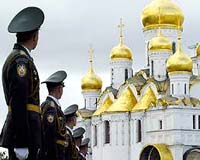 |
Moscow (AFP) March 16, 2010 US Secretary of State Hillary Clinton arrives in Russia Thursday for crucial talks on clinching a new nuclear disarmament treaty between the Cold War foes. The 1991 Strategic Arms Reduction Treaty (START) expired in December and negotiators have failed to agree a successor -- to the embarrassment of two powers keen to promote a "reset" in sometimes troubled relations. The official reason for Clinton's two-day visit is a meeting of the Middle East diplomatic quartet. But officials from both sides have confirmed she will have bilateral negotiations on START with her Russian counterpart Sergei Lavrov. US President Barack Obama and Russia's Dmitry Medvedev had targeted a new agreement by the end of 2009 to drastically reduce nuclear stockpiles but negotiations have lumbered on in Geneva amid reports of stark differences. Russian and US officials insist the remaining issues are technical and to be expected given the final document will be hundreds of pages long and must be translated in English and Russian without discrepancies. "We have never spoken of any disagreements. A normal process of negotiation is under way. This is a very voluminous document," said Russian foreign ministry spokesman Andrei Nesterenko. The New York Times reported last week that Obama was frustrated that Medvedev was linking the disarmament treaty with a dispute on US plans to install missile defence facilities in Eastern Europe. Moscow was angered by an announcement in January that Romania would host elements of a US missile shield, The New York Times said. Defence analyst Pavel Felgenhauer said the key sticking point had become Russian demands that the United States imposes limits on the missile shield, a restriction the US Senate would refuse to accept when the treaty comes for ratification. "They are trying to find a formula that could suit both sides," said Felgenhauer, defence commentator for Russia's Novaya Gazeta newspaper. "The United States wanted to sign an agreement quickly to improve the atmosphere. But this did not happen and instead of refreshing relations it's been creating problems," he said. In their latest telephone conversation Saturday, both presidents "expressed satisfaction with the "highly advanced state of preparations" for the new accord and said firm dates could already be set, the Kremlin announced. Some reports have said that the two sides are keen to wrap up the process before the United States hosts a nuclear security summit from April 12-13. Russia's Kommersant daily reported Tuesday that Ukraine had offered to host the signing of the new treaty to promote its status as an ex-Soviet state with equal ties to East and West. "It will be an important milestone. It's been one of the key points of what needed to be done to get this relationship restarted," said ex-US ambassador to Russia James Collins, director of the Russia programme at the Carnegie Centre. US-Russia relations became mired in distrust under President George W. Bush and a new nuclear treaty would provide the current leaders with much-needed proof they have succeeded in turning this around. Signed in 1991, START led to huge reductions in the US and Russian nuclear arsenals and imposed verification measures to build trust between the two former Cold War foes. The broad outlines of a replacement treaty have been clear since July, when Obama and Medvedev agreed to slash the number of warheads on either side to between 1,500 and 1,675. The United States has said it currently has some 2,200 nuclear warheads, while Russia is believed to have about 3,000.
Share This Article With Planet Earth
Related Links Learn about nuclear weapons doctrine and defense at SpaceWar.com Learn about missile defense at SpaceWar.com All about missiles at SpaceWar.com Learn about the Superpowers of the 21st Century at SpaceWar.com
 Russia-US nuclear treaty ready soon: Kremlin
Russia-US nuclear treaty ready soon: KremlinMoscow (AFP) March 14, 2010 US President Barack Obama and his Russian counterpart Dmitry Medvedev have agreed that Washington and Moscow are close to reaching agreement on a new nuclear disarmament treaty, the Kremlin said. US and Russian negotiators have been meeting in Geneva to discuss a successor to the 1991 Strategic Arms Reduction Treaty (START), a landmark Cold War-era nuclear arms pact which expired in December ... read more |
|
| The content herein, unless otherwise known to be public domain, are Copyright 1995-2010 - SpaceDaily. AFP and UPI Wire Stories are copyright Agence France-Presse and United Press International. ESA Portal Reports are copyright European Space Agency. All NASA sourced material is public domain. Additional copyrights may apply in whole or part to other bona fide parties. Advertising does not imply endorsement,agreement or approval of any opinions, statements or information provided by SpaceDaily on any Web page published or hosted by SpaceDaily. Privacy Statement |